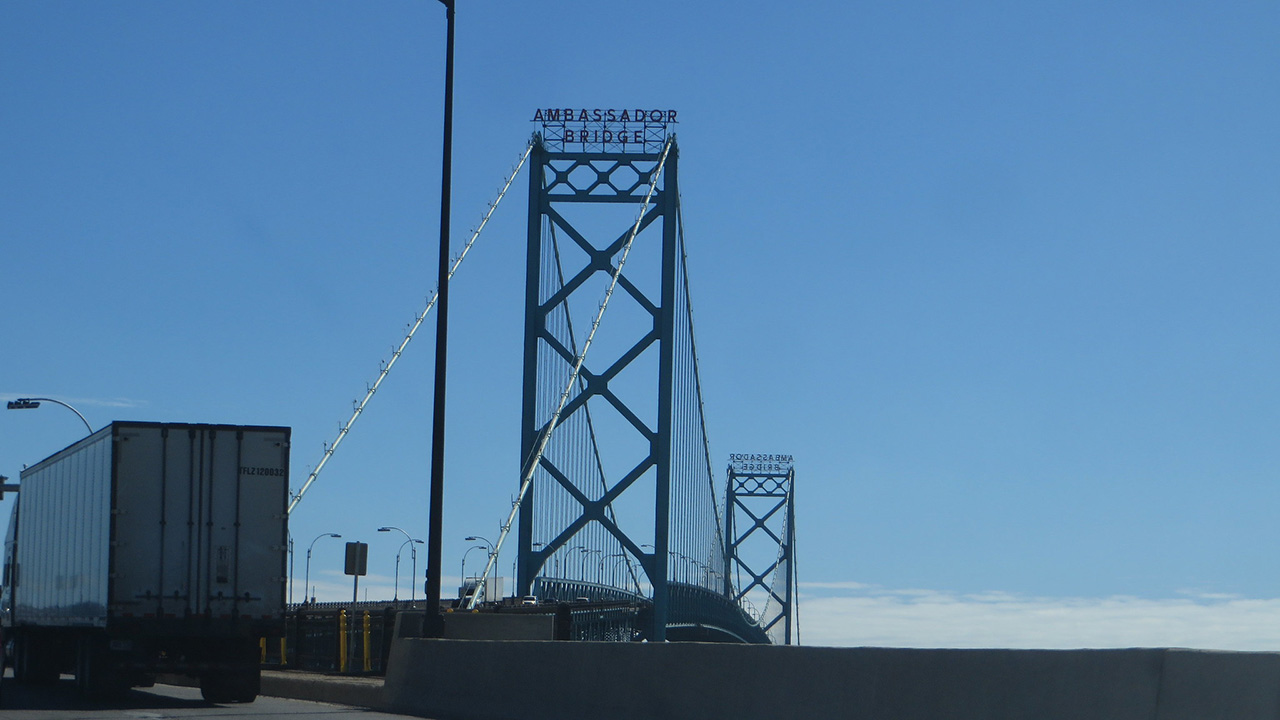Ambassador Bridge protest impacting auto industry
About 100 protesters unhappy with Canadian COVID-19 restrictions and vaccine mandates for people entering the country have shut down the bridge since Monday. About one-quarter of all trade between Canada and the U.S. goes across the Ambassador and much of it is for the auto industry.

The Ambassador Bridge remains shut down by protesters, and it might start having an impact on the local economy.
About 100 protesters unhappy with Canadian COVID-19 restrictions and vaccine mandates for people entering the country have shut down the bridge since Monday.
Windsor Mayor Drew Dilkens says he’s reached out to federal and provincial governments for help and local police are trying to de-escalate the situation.

“You have a number of people who were on the ground who were part of the protest group who have overtly stated that this cause is so passionate for them. [They feel such] passion for this particular cause that they’re willing to die for [it]. And I think one can appreciate that if you have people who [feel] that sentiment, the situation can escalate and become very dangerous for police and those members of the public in very short order.”
Windsor Police Chief Pamela Mizuno says officers knew a protest was coming, but officers only took efforts to mitigate traffic congestion.
“We had an indication that this was going to happen, and we started preparing and we took action in order to manage the situation as best we could,” Mizuno says.
Dilkens says officials are looking at nonviolent ways to remove the demonstrators who have set up camp on Huron Church Road just across the bridge. Responding to the protesters with a show of force would just make the situation worse, he says.
“While it may be gratifying for some to see the forced removal of the demonstrators, such action may inflame the situation and first certainly cause more folks to come here and add to the protest and we don’t want to risk additional conflict.”
The demonstration in Windsor is the latest iteration of the Freedom Convoy where people — upset with COVID-19 restrictions and vaccine mandates for international truckers — have disrupted daily life in Ottawa and interfered with another border crossing in Montana. In Michigan, vaccinated truckers have been forced to drive the extra 60 miles to the Blue Water Bridge in Port Huron because of the Ambassador Bridge blockade.
Strain on supply chains
The protests are putting a strain on supply chains. About $135 billion in trade between the U.S. and Canada goes across the Ambassador Bridge every year. One third of that is auto related, says Hugo DeCampos, an assistant professor of supply chain at Wayne State University.
“It’s absolutely critical whenever there’s a stoppage, it’s going to be one of the largest industries impacted by the stoppage of the Ambassador Bridge,” he says.
The automotive industry has been dealing with supply chain issues throughout the pandemic, most notably a shortage of semiconductors.
That’s led to a parts shortage — and a temporary cut to one shift at a Stellantis plant in Windsor.
DeCampos says it’s expensive to keep vast amounts of inventory and that leaves automakers susceptible to shortages.
“Now when you stop that bridge, if you have those parts that are required hourly then you’re in trouble,” DeCampos says.
DeCampos says parts shortages are expensive for automakers.
“Anytime an assembly line gets shut down temporarily then not only the assembly plant is not recovering the cost for that machinery and equipment, but now they’re paying some of the highest skilled and highest paid workers to stand idly not creating value. So you get hit with a double whammy,” DeCampos says.
Update: In a statement, Ford Motor Co. says “…this interruption on the Detroit/Windsor bridge hurts customers, auto workers, suppliers, communities and
companies on both sides of the border.” The statement goes on to say that a plant in Oakville, ON ran on a reduced schedule and that the Windsor engine plant was down.
Trusted, accurate, up-to-date.
WDET strives to make our journalism accessible to everyone. As a public media institution, we maintain our journalistic integrity through independent support from readers like you. If you value WDET as your source of news, music and conversation, please make a gift today.

